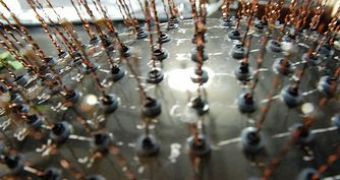A team of European researchers showed that the materials out of which medical devices and implants are made are biocompatible and should not cause health problems as it had been suggested.
And for excluding any kind of danger, there are allergy tests that can easily be made, AlphaGalileo reports.
It all started from the shape memory alloys – SMAs, that are highly used in medical implants, blood vessel stents, guide wires for catheters, filters and actuators.
Any devices or components made from these materials can be bent and squeezed into a body cavity or vessel and regain their original shape at the end.
Despite several studies that show them to be completely biocompatible, there have been several concerns about the toxicity of SMAs, because they often contain copper or nickel.
This has motivated Rebeka Rudolf of the University of Maribor, Slovenia, and colleagues there and at the University of Leoben, Austria, and the Military Medical Academy, in Belgrade, Serbia to carry out a research and find out if there really is a danger.
They used immune system cells - human peripheral blood mononuclear cells, and experimented whether or not SMAs made from copper-aluminum-nickel (Cu-Al-Ni) and nickel-titanium (Ni-Ti) damage the body or trigger cell death.
The scientists prepared thin ribbons of SMAs, by using melt spinning, and they cultured PB-MNCs from 20 donors in a solution containing a Cu-Al-Ni SMA.
Having observed no significant changes in the production of cytokines - immune system mediators, in 18 of the 20 test cultures, they concluded that in most cases, SMAs are not harmful to the human body.
The fact that the two of the donor cells had an immune response and released inflammatory cytokines, encouraged the team to suggest that their test could be used as a way of testing patients for biocompatibility with a certain device.
The authors say that “this is the first report showing the influence of SMA materials produced as thin ribbons by spin melting technology on human cells.
“By using a simple screening test it should possible to identify those individuals who would develop an inflammatory response in contact with a biomaterial and so predict undesirable reactions before implantation,” they concluded.
The findings were published in the International Journal of Immunological Studies.

 14 DAY TRIAL //
14 DAY TRIAL //